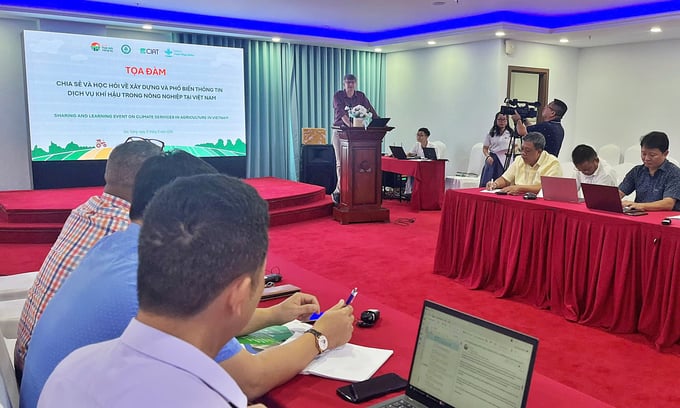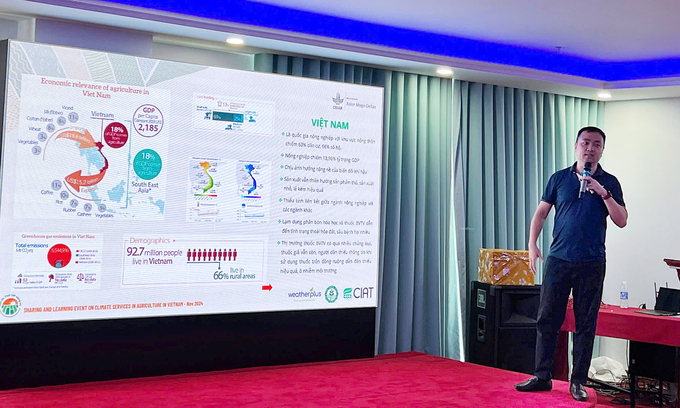May 21, 2025 | 07:17 GMT +7
May 21, 2025 | 07:17 GMT +7
Hotline: 0913.378.918
May 21, 2025 | 07:17 GMT +7
Hotline: 0913.378.918
Digital climate advisory services (DCAS) are unlocking new opportunities for Vietnam's agriculture sector. However, they face critical challenges regarding resources, infrastructure, financial mechanisms, and farmers' reluctance to change their long-established farming habits. These problems require collaboration among stakeholders to pave the way for more sustainable development of these services in Vietnam.

Kees Swaans, the CIAT representative, spoke at the seminar. Photo: CIAT.
"I used to have no idea when pests would emerge or when was the best time to prevent or control them. I would only spray pesticides when the damage was visible," shared Nguyen Quoc Tinh, a rice farmer from Vong The commune, Thoai Son district, An Giang province, recalling his experience from 2022 backward.
In the winter-spring crop of 2022–2023, Tinh's rice fields were ravaged by gall midges. Despite multiple pesticide sprays, his yield that season dropped to 7.2 tons per hectare - 1 ton below the average.
Determined to avoid such losses, Tinh actively sought agricultural advisories and learned about the Agro-Climatic Bulletins sent via Zalo by extension officers in 2023. Initially skeptical about staying updated on pests from home, his confidence grew after field visits confirmed the bulletin's accurate forecasts.
One memorable experience came during the 2023–2024 winter-spring crop. The bulletin helped farmers in Vong The detect early signs of brown planthoppers and white-backed planthoppers. Instead of reactive spraying, Tình followed the bulletin's advisory, spraying at the right time based on pest density and crop growth stages and using suitable pesticides.
Tinh's story reflects the shared struggles of hundreds of thousands of farmers in An Giang, who are increasingly adapting to modern agricultural challenges. Every stage in rice cultivation, from soil preparation, sowing, and water management to flowering and pesticide application, requires meticulous planning.
This transformation extends beyond An Giang. Other provinces in the Mekong Delta, such as Hau Giang, are also actively guiding farmers to adopt the Agro-climatic Bulletin. Nguyen Thi Huyen Nhung, an officer at the Hau Giang Department of Agriculture and Rural Development, emphasized how digital tools like Zalo have made it easier to deliver recommendations to farmers.
"The 10-day Agro-Climatic Bulletin tin now provides daily weather forecasts. For instance, if rain is expected, farmers can adjust their soaking and sowing schedules accordingly," she said.

Delegates discussed the results and plans for future implementation. Photo: CIAT.
The Agro-Climatic Bulletin was piloted in the Mekong Delta in 2020 as part of the DeRISK SE Asia project and later expanded under the Asia Mega-Deltas Initiative. Jointly implemented by the International Center for Tropical Agriculture (CIAT) and the Department of Crop Production (MARD) since October 2022, it has reached approximately 291,000 users as of October 2024. Over 1,000 Zalo groups with more than 55,000 members have been established, attracting the participation of around 220 cooperatives.
Despite initial benefits, scaling DCAS like the Agro-Climatic Bulletin faces challenges. Experts highlighted these obstacles during a recent "Sharing and Learning on Climate Services in Agriculture in Vietnam" seminar on November 21 in Soc Trang province.
Kees Swaans, Regional Climate Action Lead for Asia at CIAT, noted, "Farmers' adoption of agricultural mobile applications remains low, and many hesitate to make farming decisions based solely on online information." Furthermore, recent research by CIAT revealed that only 2 out of 15 surveyed DCAS+ were profitable, raising concerns about the sustainability of such services.
Nguyen Ngoc Quang, Deputy CEO of WeatherPlus- the first private company licensed to provide weather forecasts and warnings in Vietnam - pointed out the high cost of weather-monitoring infrastructure and forecasting technology costs as significant barriers.
Additionally, Bui Chi Nam from the Sub-Institute of Hydrometeorology and Climate Change stressed the need for detailed data and skilled meteorology and climate science personnel to deliver accurate, localized forecasts and recommendations.
Do Thanh Thanh from Tep Bac, a company providing digital platforms and devices for aquaculture, shared that despite offering advanced tools like water quality meters and remote-controlled feeding machines, reluctance to change their entrenched farming habits still needs to be addressed.

Some analysis of Vietnam's current agriculture. Photo: CIAT.
At the seminar, delegates discussed opportunities and strategies to overcome these bottlenecks.
"Some emerging technologies, such as IoT, AI, Big Data, and Blockchain, could drive the development of DCAS shortly," Nguyen Ngoc Quang from WeatherPlus.
Nguyen Hong Tin, Head of Agricultural Systems at the Mekong Development Research Institute, underscored the importance of evaluating the effectiveness of DCAS. He proposed using econometric models to determine whether DCAS usage improves farmers' productivity and profitability. Tin also suggested, "We could expand the target user base of climate service. Currently, we mainly focus on farmers, but other actors like input suppliers, traders, and processors could be interested in these services."
Experts agreed on the critical role of stakeholder collaboration in ensuring sustainable and effective DCAS models. Kees Swaans from CIAT emphasized that "As an agricultural research organization, CIAT could develop and pilot DCAS models. We can help research assessments of DCAS's costs and benefits for farmers and other value chain actors and research business models for sustainable scaling. However, implementation and scaling up must be done by or in collaboration with public or private partners."
Nguyen Duc Trung, Monitoring and Evaluation Manager at Winrock International, suggested a market-based approach. "We could design financial mechanisms where companies at the upper stream of the agricultural value chains use and pay for DCAS provided by private companies. These companies would then distribute DCAS to farmers in their sourcing areas. The aim is to create an ecosystem where private entities interact and collaborate, with the government providing supportive mechanisms and policies. At the same time, farmers benefit from DCAS without necessarily paying for it," Trung explained.
Le Thanh Tung, Deputy Head of the Department of Crop Production, emphasized the importance of coordination between government agencies and businesses to avoid overlaps and conflicting information. "Government agencies, NGOs, and businesses are already providing climate information and advisories to farmers. Although their approaches differ, they can collaborate or complement each other to ensure that digital climate advisory services reach farmers more effectively," Tung noted.
With policies promoting digital transformation in agriculture and climate change adaptation, Vietnam provides a favorable environment for DCAS to develop. Integrated into national programs like the National Climate Change Strategy and "One Million Hectares High-Quality Low-Carbon Rice in the Mekong Delta," DCAS promises to enhance farmers' livelihoods and resilience against climate challenges.
The seminar "Sharing and Learning on Climate Services in Agriculture in Vietnam" was organized on November 21, in Soc Trang. This event was part of Work Package 3 of the Asian Mega-Deltas Initiative, focusing on climate risk mitigation in Asia's major deltas. The initiative aims to create resilient, inclusive, and productive deltas that maintain socio-ecological integrity, adapt to climatic and other stressors, and support human prosperity and well-being.
Work package 3 (WP3) on De-risking delta-oriented value chains under the AMD aims to reduce climate risks among smallholder farmers and facilitate investment in deltaic value chains through digital climate advisory and complementary services.
Translated by Huong Giang

(VAN) In 2024, over 295 million people across 53 countries and territories faced acute hunger—an increase of almost 14 million people compared to 2023, while the number of people facing catastrophic levels of hunger reached a record high.

(VAN) World Environment Day 2025 (June 5) carries the theme 'Beat Plastic Pollution' continuing to emphasize the global urgency of addressing the plastic waste crisis.

(VAN) This was the assessment shared by experts at the workshop titled 'Assessing the Role and Potential of Low-Emission Rice Production Systems in Vietnam,' held on the morning of May 19.

(VAN) Cai Rong Port is the fisheries control center of Quang Ninh, helping to monitor fishing vessels, combat IUU fishing, and remove the EC's 'yellow card'.

(VAN) The German Agricultural Society (DLG) explores the possibility of establishing a mechanization service center in Vietnam’s Mekong Delta to support farmers in accessing and utilizing advanced machinery.

(VAN) On May 16, the Department of Water Resources Management, in collaboration with the Food and Agriculture Organization of the United Nations (FAO), held a signing ceremony for the GEF-8 project document.

(VAN) Food safety, mechanization, vocational training, and market opening are key areas of cooperation expected between the Vietnamese Government and the Federal Republic of Germany.